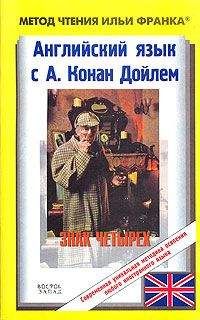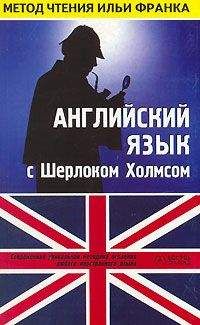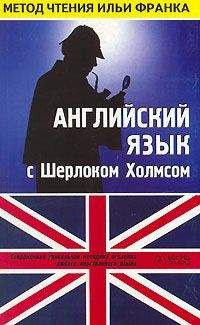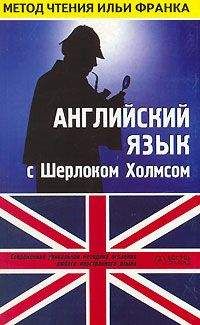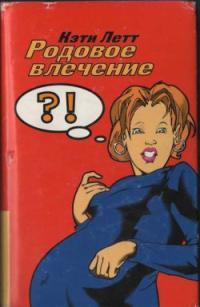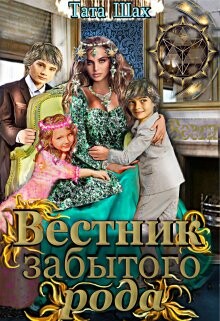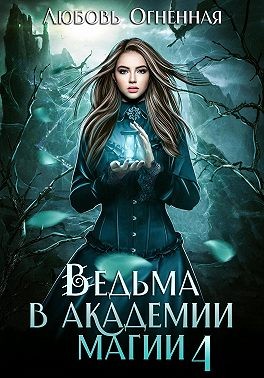Arthur Conan Doyle - Английский язык с Шерлоком Холмсом. Второй сборник рассказов
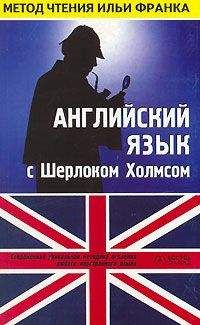
Помощь проекту
Английский язык с Шерлоком Холмсом. Второй сборник рассказов читать книгу онлайн
“Well, it ended by their taking Blessington and hanging him (дело кончилось тем, что они схватили Блессингтона и повесили его). The matter was so prearranged that it is my belief (преступление было настолько хорошо спланировано заранее, что я полагаю: «это мое убеждение/мнение»; to arrange — приводить в порядок, расставлять; устраивать, организовывать, подготавливать; to prearrange — подготавливать заранее) that they brought with them some sort of block or pulley (что они принесли с собой какой-то блок или шкив) which might serve as a gallows (который можно было использовать в качестве виселицы). That screw-driver and those screws (эти отвертка и шурупы) were, as I conceive, for fixing it up (предназначались, как я полагаю, для крепления его /блока/ к потолку). Seeing the hook, however they naturally saved themselves the trouble (однако, увидев крюк, они, естественно, избавили себя от /лишних/ хлопот). Having finished their work they made off (покончив с делом, они убежали), and the door was barred behind them by their confederate (а дверь была закрыта за ними на засов их сообщником; bar — брусок, блок, кусок; полено; to bar — запирать на засов).”
judicial [ʤu:ˈdɪʃ(ǝ)l], drawer [ˈdrɔ:ǝ], conceive [kǝnˈsi:v]
“Having secured him, it is evident to me that a consultation of some sort was held. Probably it was something in the nature of a judicial proceeding. It must have lasted for some time, for it was then that these cigars were smoke. The older man sat in that wicker chair; it was he who used the cigar-holder. The younger man sat over yonder; he knocked his ash off against the chest of drawers. The third fellow paced up and down. Blessington, I think, sat upright in the bed, but of that I cannot be absolutely certain.
“Well, it ended by their taking Blessington and hanging him. The matter was so prearranged that it is my belief that they brought with them some sort of block or pulley which might serve as a gallows. That screw-driver and those screws were, as I conceive, for fixing it up. Seeing the hook, however they naturally saved themselves the trouble. Having finished their work they made off, and the door was barred behind them by their confederate.”
We had all listened with the deepest interest to this sketch of the night’s doings (мы все с огромным интересом слушали это описание ночных событий), which Holmes had deduced from signs so subtle and minute (которое Холмс сумел сделать на основании столь мелких и незначительных фактов; subtle — неуловимый, тонкий; едва различимый; minute — мелкий, мельчайший) that, even when he had pointed them out to us (что, даже когда он указал нам на них), we could scarcely follow him in his reasoning (мы с большим трудом могли следить за ходом его мысли). The inspector hurried away on the instant to make inquiries about the page (инспектор тотчас же ушел наводить справки о мальчишке-слуге), while Holmes and I returned to Baker Street for breakfast (а мы с Холмсом вернулись на Бейкер-стрит, чтобы позавтракать).
“I’ll be back by three (я вернусь к трем),” said he, when we had finished our meal (сказал он, когда мы закончили есть). “Both the inspector and the doctor will meet me here at that hour (инспектор и доктор встретятся здесь со мной в этот час), and I hope by that time to have cleared up any little obscurity (и я надеюсь к тому времени выяснить все мельчайшие неясные моменты; obscurity — мрак; темнота, тьма; непонятность, неясность; obscure — темный, слабо освещенный, тусклый) which the case may still present (которые все еще могут оставаться в этом деле: «которые это дело может еще представлять»; to present — представлять, являть собой; преподносить).”
Our visitors arrived at the appointed time (наши гости прибыли в назначенное время), but it was a quarter to four before my friend put in an appearance (но мой друг появился лишь без четверти четыре; to put in an appearance — появиться, показаться /особенно ненадолго/). From his expression as he entered, however (когда он вошел, по выражению его лица), I could see that all had gone well with him (я понял, что у него все прошло удачно = что его поиски увенчались успехом).
subtle [sʌtl], obscurity [ǝbˈskju:ǝrɪtɪ], appearance [ǝˈpɪ(ǝ)rǝns]
We had all listened with the deepest interest to this sketch of the night’s doings, which Holmes had deduced from signs so subtle and minute that, even when he had pointed them out to us, we could scarcely follow him in his reasoning. The inspector hurried away on the instant to make inquiries about the page, while Holmes and I returned to Baker Street for breakfast.
“I’ll be back by three,” said he, when we had finished our meal. “Both the inspector and the doctor will meet me here at that hour, and I hope by that time to have cleared up any little obscurity which the case may still present.”
Our visitors arrived at the appointed time, but it was a quarter to four before my friend put in an appearance. From his expression as he entered, however, I could see that all had gone well with him.
“Any news, Inspector (есть новости, инспектор)?”
“We have got the boy, sir (мы поймали мальчишку, сэр).”
“Excellent, and I have got the men (отлично, а я поймал остальных).”
“You have got them (вы поймали их)!” we cried, all three (вскричали мы хором).
“Well, at least I have got their identity (ну, по крайней мере, установил их личности). This so-called Blessington is, as I expected (этот так называемый Блессингтон, как я и ожидал), well known at headquarters (хорошо известен в /полицейском/ управлении), and so are his assailants (как и те, кто на него напал; assailant — противник, нападающая сторона). Their names are Biddle, Hayward, and Moffat (их имена: Биддл, Хэйуорд и Моффат).”
“The Worthingdon bank gang (банда, /ограбившая/ банк в Уордингдоне),” cried the inspector (воскликнул инспектор).
“Precisely (совершенно верно),” said Holmes.
“Then Blessington must have been Sutton (значит, Блессингтон — это Саттон).”
identity [aɪˈdentɪtɪ], headquarters [ˈhedˌkwɔ:tǝz], assailant [ǝˈseɪlǝnt]
“Any news, Inspector?”
“We have got the boy, sir.”
“Excellent, and I have got the men.”
“You have got them!” we cried, all three.
“Well, at least I have got their identity. This so-called Blessington is, as I expected, well known at headquarters, and so are his assailants. Their names are Biddle, Hayward, and Moffat.”
“The Worthingdon bank gang,” cried the inspector.
“Precisely,” said Holmes.
“Then Blessington must have been Sutton.”
“Exactly (совершенно верно; exact — точный),” said Holmes.
“Why, that makes it as clear as crystal (тогда все становится абсолютно ясно; as clear as crystal — прозрачный, как кристалл; кристально чистый; четкий, ясный, понятный),” said the inspector.
But Trevelyan and I looked at each other in bewilderment (но мы с Тревельяном переглянулись: «посмотрели друг на друга» в недоумении; to bewilder — смущать, ставить в тупик; сбивать с толку, приводить в замешательство).
“You must surely remember the great Worthingdon bank business (вы, несомненно, должны помнить дело об ограблении Уортингдонского банка),” said Holmes. “Five men were in it (в нем участвовали пять человек) — these four and a fifth called Cartwright (эти четверо и пятый, по имени Картрайт). Tobin, the care-taker (Тобин, сторож), was murdered (был убит), and the thieves got away with seven thousand pounds (а воры бежали с семью тысячами фунтов). This was in 1875 (это было в 1875 году). They were all five arrested (всех пятерых арестовали), but the evidence against them was by no means conclusive (но неопровержимых доказательств /их вины/ не было; by no means — никоим образом; отнюдь не; conclusive evidence — неопровержимое доказательство). This Blessington or Sutton, who was the worst of the gang, turned informer (этот Блессингтон, или, вернее, Саттон, самый отпетый из банды, стал доносчиком). On his evidence Cartwright was hanged (благодаря его показаниям Картрайта повесили) and the other three got fifteen years apiece (а остальные трое получили по пятнадцать лет /тюрьмы/ каждый; apiece — за штуку; на каждого, каждый). When they got out the other day (когда они недавно вышли на свободу), which was some years before their full term (что было за несколько лет до их полного срока = их освободили на несколько лет досрочно), they set themselves, as you perceive (они решили, как вы понимаете; to set oneself a task — задаваться целью, ставить перед собой задачу), to hunt down the traitor (выследить предателя; to hunt — охотиться; травить, гнать; преследовать; to hunt down — выследить; поймать) and to avenge the death of their comrade upon him (и отомстить ему за смерть товарища). Twice they tried to get at him and failed (дважды они пытались подобраться к нему, но неудачно; to fail — не удаваться; потерпеть неудачу); a third time, you see, it came off (на третий раз, как видите, им это удалось; to come off — удаваться; проходить с успехом). Is there anything further which I can explain, Dr. Trevelyan (нужно ли еще что-нибудь объяснить, доктор Тревельян)?”
crystal [krɪstl], perceive [pǝˈsi:v], comrade [ˈkɔmr(e)ɪd]
“Exactly,” said Holmes.
“Why, that makes it as clear as crystal,” said the inspector.
But Trevelyan and I looked at each other in bewilderment.
“You must surely remember the great Worthingdon bank business,” said Holmes. “Five men were in it — these four and a fifth called Cartwright. Tobin, the care-taker, was murdered, and the thieves got away with seven thousand pounds. This was in 1875. They were all five arrested, but the evidence against them was by no means conclusive. This Blessington or Sutton, who was the worst of the gang, turned informer. On his evidence Cartwright was hanged and the other three got fifteen years apiece. When they got out the other day, which was some years before their full term, they set themselves, as you perceive, to hunt down the traitor and to avenge the death of their comrade upon him. Twice they tried to get at him and failed; a third time, you see, it came off. Is there anything further which I can explain, Dr. Trevelyan?”
“I think you have made it all remarkable clear (думаю, вы объяснили все предельно ясно),” said the doctor. “No doubt the day on which he was perturbed was the day (несомненно, в тот день, когда он разволновался, /был тем днем/) when he had seen of their release in the newspapers (когда он прочитал в газетах об их освобождении; to release — отпускать; освобождать /из заключения/; выпускать на волю).”
“Quite so (совершенно верно). His talk about a burglary was the merest blind (его разговор о краже со взломом был всего лишь для отвода глаз; blind — штора, жалюзи; предлог, отговорка; blind — слепой).”
